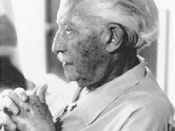- -
The young adult has numerous stresses placed upon them through the route of development.
Erikson has theorised developmental stages of growth into tasks. Of Eriksons' theoretical tasks,
one task describes the theory of intimacy versus isolation. This task theory can be examined using
the normative crisis model. The knowledge of developmental tasks of the young adult can be
beneficial to the nurse especially associated with their ability to relate to the young adult.
One of the stages in life is the young adult, which suggests significant changes and an increase of
responsibility. This stage of development is described as between twenty and forty years, where
'...the potential for furtherance of intellectual, emotional and even physical development occurs'.
(Gething, 1995, p.377). As people age the progress of the developmental stages can differ, so they
have formulated to assess the progression by using two principal crisis models. The first, are the
normative crisis model and the second includes the timing of events crisis model.
The normative
crisis model has been powerful in shaping the psychology of the developmental stages as it has
allowed theorists to imply that stages of development can follow an age related time sequence.
(Gething, 1995).
The normative crisis model suggests that human development has a built in ground plan in which
crisis as describe by Erikson are seen as a requirement that must be resolved by the person before
successful progression from one developmental stage to another. Such achievement of this task
crisis should provide the young adult with the ability to challenge previous ideas held by the
adolescent about intimacy and isolation. This model is adapted for progression of the tasks to
follow the chronological age of the adult, while the related social and emotional changes progress
through a sequence that Erikson characterises...


